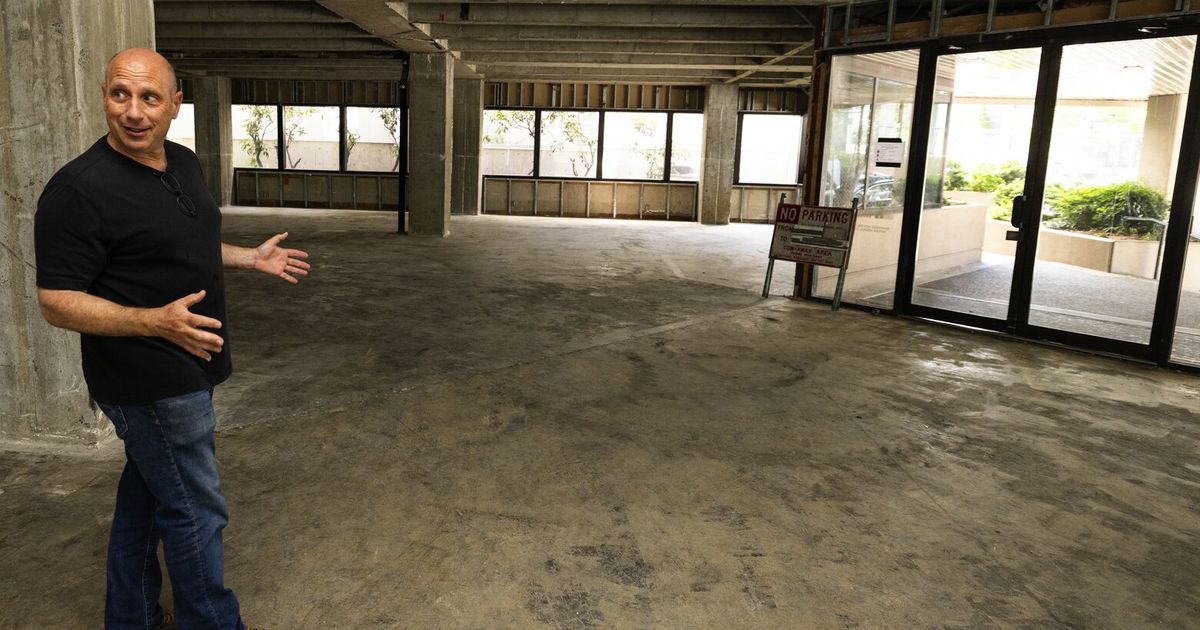
The Seattle City Council voted unanimously Tuesday to cut red tape and slash costs for developers who convert commercial buildings into housing, a bid to address the city’s glut of unused office space and shortage of housing.
Seattle will soon exempt conversion projects from certain building regulations and fees that apply to other types of development. Among them: the Mandatory Housing Affordability program, or MHA, the city policy that requires developers to set aside affordable apartments or pay toward an affordable housing fund.
The legislation, submitted by Mayor Bruce Harrell in March, will take effect about a month after he signs it into law.
If successful, the new effort could bring hundreds more apartments to central Seattle neighborhoods such as downtown. The effects could be muted, though, because converting office buildings is technically challenging, the commercial real estate market is sluggish, and conversion projects may mostly generate market-rate housing while the city also has a vast need for affordable homes.
The city’s new incentives are “a step in the right direction, for sure, but that doesn’t mean that every conversion is going to work,” said Jordan Selig, executive vice president at Martin Selig Real Estate.
The policy attempts to crack a puzzle that Seattle, like other American cities, faces in the wake of the pandemic: Significant amounts of office space are sitting empty and hemorrhaging value while severe housing shortages persist. The obvious question: Could we simply turn those office buildings into thousands of apartments or condos?
“Right now, they’re sitting empty, and we could fill these buildings with people,” Councilmember Tanya Woo said before Tuesday’s vote.
But conversions are complex and expensive due to an array of fundamental design issues. Open office space, once home to a maze of cubicles, usually means significant areas of the building so far from windows that apartments would feel more like caves. Windows may not open, forcing costly replacements to suit housing. Plumbing, heating, ventilation and air conditioning systems likely need upgrades or replacement. All those factors drive up the cost of conversions.
To try to ease the financial pain, Seattle and other cities have looked to sweeten the deal for builders. Along with Seattle’s legislation, Washington lawmakers last year voted to allow cities to offer developers a sales tax break when they pursue a conversion that includes some affordable homes. Seattle plans to enact that tax break, too. State and local governments from New York to Pittsburgh to San Francisco are trying similar ideas.
Along with developers planning to convert existing buildings, those with commercial projects permitted but not yet built could tap into Seattle’s new exemptions from design review and other regulations if they switch the project to housing. Those projects would owe affordable housing fees based on the original project plan.
A work in progress
While conversion projects are difficult, some developers think they can make the math work.
In Seattle’s Uptown neighborhood, just a few blocks from Climate Pledge Arena, developer Marc Angelillo surveys the cavernous, stripped-down interior of a four-story 1980s office building. As mid-tier office buildings plummeted in value, Angelillo’s firm got this building at a steal last year, paying $7 million — nearly $1 million shy of what the building sold for in 2005.
The vision? Transform the building into apartments.
The work ahead? Enormous.
After knocking down walls and tearing out the building’s HVAC system in recent months, developers plan to rebuild the space from the inside out. They will add new earthquake protections, upgrade the plumbing, replace an elevator for accessibility, swap some of the windows with those that can open, add a fifth story and build out the kitchens, bathrooms and living spaces of 74 apartments. Angelillo hopes construction will start next year.
The new city legislation will slash more than $1 million in MHA fees from the project’s cost and bypass a design review process that can also add expense, Angelillo said. The sales tax exemption, if enacted by the city, would cut millions more from the project’s construction budget. Angelillo declined to share a total project budget.
If the plans become reality, some apartments will come with water views through the ribbon of windows wrapping around the building. On the other side, tenants and others will look squarely out at the Space Needle. Most of the homes will rent at market-rate costs, though some units will be affordable at various levels to qualify for tax exemptions.
“Just a matter of the cost”
While progressives are sometimes skeptical of financial breaks for private developers or market-rate housing, Harrell’s proposal faced little resistance at City Hall. Council members narrowed the MHA exemption to only certain areas of the city, but those are the places most likely to see conversion projects.
Councilmember Tammy Morales, the body’s most left-leaning member, said applying MHA fees in some areas will allow the city to “decide whether exemptions should be expanded or lifted in the future.”
“Without incentives, these conversions wouldn’t be possible because they are a uniquely expensive type of product to build,” Morales said before Tuesday’s vote.
Just how many projects will now be possible remains an open question.
Seattle’s planning department expects developers could undertake up to 12 projects with 1,000 to 2,000 units of housing in the next seven years. (Seattle needs more than 100,000 new homes over the next two decades.)
Even for developers who may be interested, significant other hurdles remain, including high interest rates and construction costs. Permit applications for all types of new apartment development have taken a nosedive in recent years.
At a mixed-use building in Belltown, Selig’s firm struggled to find an office tenant and now hopes to convert 11 floors of office space into 160 additional high-end apartments.
In today’s market, Selig said, “every building can be converted — literally every building — it’s just a matter of the cost.”
